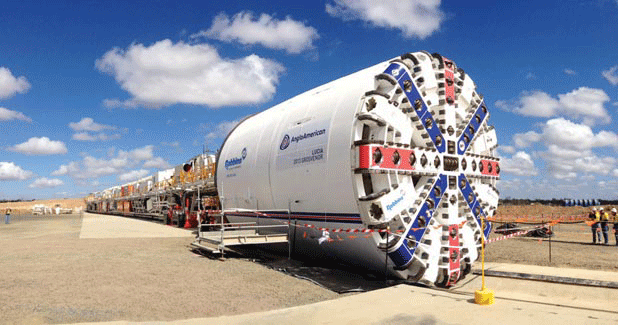
Light at the End of the Tunnel
Use of tunnel boring machines is on the rise with many metro rail projects are now put these machines on job while already in use at water and gas pipeline projects. The use is going to increase in the coming years with many new projects are in the pipeline. <p></p><p> Tunnel boring machine (TBM) was not so popular in Indian market till a couple of years back. But the 17 TBMs introduced for one project of Mumbai Metro Line 3 has put this high value machine in news and today these machines are in news on a regular basis on their job progress. Use of TBMs has grown considerably with the development of metro projects across the country. With many new big and unique projects in the pipeline, scope for use of TBMs is on the rise.</p><p> <span style="font-weight: bold;">TBMs: Applications </span><br />TBM is mainly applied to urban subway tunnel, cross-river roadway or railway tunnel, sub-sea roadway or railway tunnel, urban municipal engineering tunnel, oil-gas pipeline tunnel, water tunnel, etc. They are also applicable to coal mine tunnel, inlet and drainage tunnel for nuclear power project, city's underground street passage, etc. </p><p> Generally, TBMs are preferred in construction of tunnels in all types of geology with minimum disturbance and deterioration to environment. For example metro rail projects in congested urban areas are difficult or rather unthinkable to construct without TBMs. The construction of tunnels for irrigation and hydro power project in difficult seismic conditions or under wildlife areas is also an example where construction using TBMs is a preferred method. Another useful utilisation is water, sewerage, sea-outfall, transport tunnels under sea, river, water bodies is much easier using TBM technology. </p><p> Especially in metro rail projects, TBMs are being used currently. These include Delhi Metro, Kolkata Metro, Mumbai Metro, Lucknow Metro etc. Bangalore Phase I and Chennai Phase I also used TBMs.</p><p> <span style="font-weight: bold;">Types of TBMs</span><br />TBMs are project specific as every project has different need as per geological characteristics of the subsoil. Some of the major types include: </p><ul><li><p><span style="font-weight: bold;">EPB shield TBM:</span> For rocky to soft ground conditions - clay, slit, loam, low water permeability</p></li><li><p><span style="font-weight: bold;">Mixshield TBM:</span> For heterogeneous ground-sand gravel, high water permeability and water pressure</p></li><li><p><span style="font-weight: bold;">Single-shield TBM:</span> For rock ground condition - soft, brittle rock to hard basalt </p></li><li><p><span style="font-weight: bold;">Double-shield TBM:</span> For all kind of stable and unstable rock and mix ground conditions</p></li><li><p><span style="font-weight: bold;">Gripper TBM:</span> For hard rock, stable rock conditions such as granite, gneiss or basalt</p></li><li><p><span style="font-weight: bold;">Muti-mode TBM:</span> Convertible at pre-determined chainage for complex mix geology, high water pressure.</p></li></ul><p> <span style="font-weight: bold;">Choosing right machine</span><br />Right selection of machinery and equipment plays an important role in the timely completion of any project. TBMs are job-specific equipment. The major selection criteria is study the characteristics of the subsoil, the geotechnical and hydro-geological conditions. The ground condition parameters have a great influence on the design of the cutting wheel, its opening ratio and the required tools. Taking the appropriate measure can minimise wear, tear and clogging, while optimising soil and rock excavation.</p><p> <span style="font-weight: bold;">Advantages</span><br />Compared with traditionally blasting method, TBM performs better in environmental protection. It has low labour intensity and good cost performance. Working with TBMs is more cost-efficient, safer, quicker, more eco-friendly and can be adapted exactly to ground conditions, diameters, depth, gradients, curves, length and topographic condition along the route. The conventional method for tunnelling is very tedious and time taken and has restrictions in several routes, would be the reason for increasing demands of TBMs for successful execution of projects.</p><p> <span style="font-weight: bold;">Challenges</span><br />There have been many challenges related to the operations of TBM. One of the major challenges is dealing with different geologies; launching of the TBM. From the contractor's point of view, arranging land, utility diversions and taking permission from different agencies for diversions is also a challenge. Traffic management is also considered to be one of the biggest challenges which a contractor has to encounter in constructing these types of projects. According to a report, in a recent disaster at Kolkata underground metro project site, buildings developed cracks and several collapsed apparently due to tunnelling work for the under-construction 16.60-km East West Metro Railway project, a part of which constitutes India's first under-river train line. This was happened when a TBM hit an aquifer resulting in water and silt gushing in and triggering serious ground loss on several roads in central Kolkata's Bowbazar area. </p><p> <span style="font-weight: bold;">Changing perceptions</span><br />Earlier, contractors and government officials used to follow drill and blasting method for excavation of tunnels, which were cheaper means of constructing an underground tunnel but introduction of TBMs in the market has changed the mindset of the contractors. TBMs have the advantages of limiting the disturbance to the surrounding ground and producing a smooth tunnel wall. This significantly reduces the cost of lining the tunnel, and makes them suitable to use in heavily urbanised areas. </p><p>Gradually, people started became aware about this technology which is an advanced, robust, high-speed and efficient machine that not only completes the job in time but gives high returns and world-class quality features inbuilt into that as well. It is rather the cleanest way of tunnelling, which eliminates the noise, fumes and other environmental hazards of conventional tunnelling method.</p><p> <span style="font-weight: bold;">Opportunities<br />India has a large population </span><br />and a problem of urban traffic congestion, which strongly demands a development of urban underground rail transit. And due to India's dense population, underground pipeline network construction is a basic requirement to guarantee the people's livelihood. With the massive expansion plan in India today, tunnels will become an integral part of Indian infrastructure henceforth industry has tremendous opportunity in the coming years. Thus, there will be a big increase in the TBM demand in Indian market. </p><p></p>


 +91-22-24193000
+91-22-24193000 Subscriber@ASAPPinfoGlobal.com
Subscriber@ASAPPinfoGlobal.com